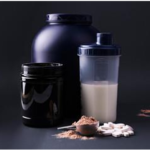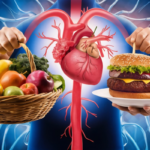One aspect of men’s health that is often overlooked is men’s mental health. On one hand, societal pressure forces men to be considered physically and mentally strong and to not show vulnerability. On the other, preventing and combating stigma and internally embedded desires discourage men from seeking help when faced with mental unhappiness.
A growing body of research highlights that nutrition plays a big role in mental health. Can food boost your mood? Studies say yes — what you eat can directly support your mental well-being and help you feel and function better.
The State of Men’s Mental Health
Surveys depict that 77% of men have suffered symptoms from such common mental health conditions as anxiety, stress, or depression, while 40% have never come out to talk about what they were feeling. With all sorts of limiting factors-even stigma and embarrassment-women tend to seek help only when symptoms are at their worst. Workload, finances, and health constitute the top stressors set forth in the most recent Stress in America survey. Nutrition is yet another factor that requires consideration.
Stats by: Mental Health Statistics
The Link Between Diet and Men’s Mental Health

Image Credit: iStock
The Science: How Food Affects the Mind
Mental health develops within a complex web of biological, environmental, and lifestyle factors. Research shows that the foods we choose act as a changeable risk factor in mental health, shaping when and how illnesses like depression, anxiety, or memory loss start and worsen.
In fact, the emerging field of nutritional psychiatry shows that what we eat can influence our mood, cognitive function, and even the risk of mental and neurological disorders later in life.
The Gut-Brain Connection
One thrilling breakthrough is the gut-brain connection-a two-way link that lets the gut speak to the brain and vice versa. The many trillions of microbes that call our intestines home send signals through immune cells, hormones, and even nerve wires.
Meal’s rich in fiber, fruit, veggies, and fermented goodies feed these good bugs, letting them churn out short-chain fatty acids (SCFAs), that serve as natural protectors for the brain.
These fatty acids keep inflammation in check, boost neurotransmitter production, and have been tied to lower levels of both anxiety and depression.

Image Credit: LinkedIn
The Impact of Poor Diet on Mental Health:
- Increased Risk of Depression and Anxiety:
Diets high in processed foods, trans fats, and added sugars have been linked to an increased risk of depression and anxiety. These foods can trigger inflammation and oxidative stress, both of which negatively impact brain function. Men who regularly consume fast food or highly processed meals are more likely to experience mood swings and depressive symptoms. A 2024 study by the National Institute of Mental Health found that men who follow a Western diet high in processed foods are 40% more likely to develop depression.

Image Credit: LinkedIn
- Fatigue and Low Energy Levels: Poor dietary choices can also contribute to fatigue and low energy levels, which, in turn, affect mental health. Diets lacking essential nutrients like iron, vitamin D, and magnesium can lead to chronic fatigue and decreased motivation. Men who experience constant fatigue are more likely to develop mental health issues, including anxiety and depression.
- Cognitive Decline Over Time: The long-term effects of poor nutrition include cognitive decline and an increased risk of neurodegenerative diseases such as Alzheimer’s. A diet lacking in brain-supporting nutrients can impair memory, decision-making, and problem-solving abilities. Men who fail to prioritize nutrition may experience more rapid cognitive decline as they age.
Dietary Strategies to Support Mental Health:
- Prioritize Whole Foods: One of the most effective ways to support mental health through diet is by prioritizing whole, nutrient-dense foods. Incorporating a variety of fruits, vegetables, lean proteins, whole grains, and healthy fats provides the essential nutrients needed to fuel brain function and stabilize mood. Avoiding processed and sugary foods can help maintain balanced energy levels and improve cognitive clarity.
- Focus on Anti-Inflammatory Foods: Foods that reduce inflammation, such as leafy greens, berries, fatty fish, and nuts, play a critical role in maintaining mental health. Inflammation has been linked to mood disorders such as depression, so incorporating anti-inflammatory foods into the diet can help prevent and manage mental health issues.
- Stay Hydrated: Dehydration can lead to confusion, irritability, and fatigue, all of which negatively affect mental health. Drinking enough water throughout the day is essential for cognitive function and mood regulation. Men should aim to consume adequate water each day to support optimal brain performance.
- Limit Alcohol and Caffeine: While alcohol and caffeine are commonly consumed by many men, both can negatively impact mental health when consumed in excess. Alcohol can disrupt sleep and exacerbate anxiety, while excessive caffeine consumption can lead to jitteriness, insomnia, and mood swings. Moderating intake of both can contribute to improved mental clarity and emotional stability.
Personalised Nutrition for Better Mental Health Support
Technological advances in nutritional sciences have focused on personalised nutrition, looking at the tailoring of diets to meet individual needs, which could include diagnosing gut microbiome profiles, considering genetic factors, or gauging lifestyle.
In males, this might mean specific mental health risk considerations, nutrient intakes tailored for mental health benefits, and long-term support for well-being.
Some Practical Tips for Men
- Prioritize whole-food meals unprocessed: Vegetables, fruits, whole grains, lean proteins, and healthy fats should be the core of every meal.
- Include fermented foods and fiber: Help your gut with some good bacteria found in the yogurt, kefir, and sauerkraut, while sticking with fiber-rich foods.
- Limit processed foods and added sugars: Fast foods, sugary drinks, and snacks are on the off-limits list.
- Do not over-restrict: Be mindful not to push yourself to extreme calorie or nutrient restriction, especially if you already have stress or are experiencing mental health issues.
- Seek help from a professional: Meaning, if things like mood or ionization appear to be a problem for you, it is best to see a doctor or dietitian for help and treatment suggestions.
Nutrition is not everything for attaining good health, yet it certainly remains the most potent and evidence-based instrument to maintain male mental health. Conscious dietary choices can help a man stabilize his mood, preserve cognitive functions, and keep his chances of having any type of mental disorder at an all-time low. Men avoid seeking mental health care for a million different reasons, unique to their gender. Food, therefore, provides a very empowering entry point for mental wellness.
Zeon’s Men Health Nutrition
In today’s busy life, nutrition loses its glory with no routine, especially with men going through different life stages and health demands. Zeon’s Men Health Nutrition, we have scientifically premixed supplements that aim to fill in nutrient gaps and support the core pillars of male wellness: energy, stamina, mental alertness, reproductive health, and healthy aging.
From high-end multivitamins to help sustain daily energy and immunity to special-purpose supplements targeting prostate health, personal well-being, and cellular vitality, Zeon Lifesciences maintains an all-inclusive gamut of supplements for men’s health. These are synthesized from a number of clinically tested ingredients, including Safed Musli, L-Carnitine, Gokshura, Zinc, and Resveratrol. Our products are built for results and backed by science.

References:
Men’s Mental Health: Why 40% of men won’t talk about it. (2023, December 19). Priory. https://www.priorygroup.com/blog/40-of-men-wont-talk-to-anyone-about-their-mental-health
Therapas. (2025, February 12). 2025 Research Literature Summary – Diet and Mental Health – Therapas. Therapas. https://therapas.com.au/research-literature-summary-diet-mental-health/
Ten Key Health and Nutrition Trends for 2025 – KHNI. (2025, March 3). Kerry Health and Nutrition Institute. https://khni.kerry.com/trends-and-insights/ten-key-health-and-nutrition-trends-of-this-year/
Therapas. (2025b, February 12). 2025 Research Literature Summary – Diet and Mental Health – Therapas. Therapas. https://therapas.com.au/research-literature-summary-diet-mental-health/
“Good Health for All”
Zeon is serving with over three decades of experience in the industry, we are working meticulously to bring knowledge of nature with innovation and advanced technology in the form of unique combinations to our consumers. Our in-house formulae and manufactured products are for all age groups in various SKUs such as Powders, Diskettes, Tablets, Capsules, Oral liquids, Caplets, Sprays, Drops, Herbal Juices, etc.
WHY CHOOSE ZEON?
State-of-the-art manufacturing facility in Himachal Pradesh spread over 28000 sq yds
4 manufacturing units under integrated complex
Serving quality products since 1987
GMP certified facility
NSF Registered
DSIR- recognized R&D Lab
NABL Accredited Quality testing
USFDA Registered
Great place to work certified
Food safety award from CII
1200+ formulations
800+ Active SKUs
30+ Recognitions
15+ Accreditations
Exclusive diskette manufacturing facility
Exclusive spray drying and dry blended powders manufacturing facility








